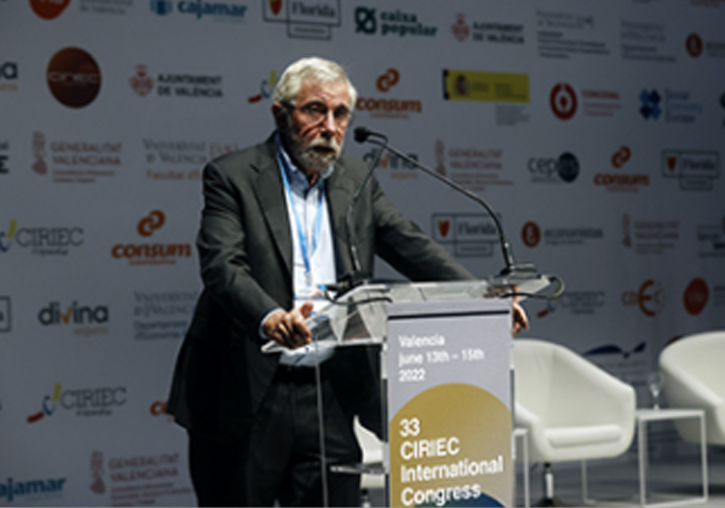Paul Krugman inugurated the 33rd CIRIEC International Congress hosted by the Faculty of Economics
- June 17th, 2022

On the 13th, 14th and 15th of June the CIRIEC turned València in the Cooperativism, Social Economy, and Public Economy word capital. Around 1,200 people participated in the inaugural session of the 33rd CIRIEC International Congress ate the Palau de les Arts Reina Sofía, where the 2008 Nobel laureate in Economics, Paul Krugman, gave the inaugural speech entitled Cooperar para un futuro mejor (Coopertating for a Better Future).
Krugman analysed the influence of social economy in two aspects: economic inequality and climate change. As for inequality he said that “it distorts society and diminishes the capacity to act collectively, because there are people who think they are not part of society”. Accordingly, social economy helps to prevent people from being left behind, with examples such as, housing, agricultural or credit cooperatives, third sector associations or trade unions, whose action is fundamental for a fairer distribution of wealth.
Regarding climate change, Krugman said that “if you are not aware about what climate change means is that you are not in the world. We are facing an extraordinary water crisis, we can’t scape from CO2 emissions”. It is a problem “of very large dimensions and must be addressed at the international level”. For this reason, “ultimately it will be the administrations that will have to take the key measures, but the social economy and the cooperatives must be part of the puzzle that solves the problem” he said.
Also, Krugman reviewed the weight of public economy in current issues such as the pandemic. “Its resolution has required public management, but individual decisions have also had to be taken, which in some cases have been conditioned by political messages”. Furthermore, the Nobel laureate said “in the United States there isn’t a universal health care and it happens that, although there are aid programmes, they are often not used because there is not enough public information”. In these cases, he pointed out, it is the social organizations that help to pass on the information to the people who need it.
For Krugman, “there are many crisis, the inflation, the war in Ukraine, the food and energy crisis... but these crises will pass”. And concluded: “Europe can surely control them. But in the case of the most serious crisis -the extreme inequality and the environmental damage- it will be the third sector organizations that can make the difference.”
Challenges of the Social Economy
The opening ceremony of the Congress was led by the president of the Generalitat Valenciana, Ximo Puig, and the Mayor of València, Joan Ribó. They were joined by José Luis Monzón, executive director of CIRIEC-Spain; Adoración Mozas, president of CIRIEC-Spain; Emili Villaescusa, president of CONCOVAL; Juan Antonio Pedreño, president of CEPES and of Social Economy Europe; Mavi Mestre, rector of the Universitat de València; and Alain Arnaud, president of CIRIEC International.
The Mayor of València, Joan Ribó, pointed out the importance of celebrating this congress in València, a city that has the 2030 Urban Strategy based on the Sustainable Development Goals in process. The objective is to make València a fully decarbonised, healthier and more prosperous city. In order to achieve these transformations, it is important how, so that no part of society is left out.
In this sense, Ribó pointed out that “what is clear to us is that the social economy and cooperativism is an effective recipe for compensating the consequences shared by all recessions and thus achieving a fairer society”.
In the same line, Ximo Puig, stated that “the society of inclusion must emerge from the pandemic, and for this the role of cooperativism and the social economy is fundamental”. In his opinion, “social justice is an investment that pays huge dividends. Fighting inequality is protecting democracy.
Also, the other speakers agreed on highlighting the role of social economy to respond to the current economic situation and the challenges it presents. Juan Antonio Pedreño pointed out that, at a European level, within the framework of the 2030 Agenda, this model is being promoted, which already provides 14 million jobs and the objective is to exceed 20 million. Alain Arnaud highlighted the need of a fairer model, that promotes freedom, after the current one in which the 70% of wealth is in the hands of the richest 10% of people.
Emili Villaescusa and Mavi Mestre agreed on the need of a joint work between the universities and business, and in this respect they highlighted the role of CIRIEC, which is based at the Universitat de València, a region with a long tradition of cooperatives, with the presence of 2,611, two o which are among the largest Valencian companies: Consum and Anecoop. Overall, cooperatives employ 59,037 people, 2.8% of total employment in the region.
On his part, José Luis Monzón, asked the speakers and participants to “be proactive in finding solutions to current problems, such as employment, pensions or the guarantee of supply of essential services such as water, energy, and transport”.
File in: Inauguracions , Facultat d'Economia
















